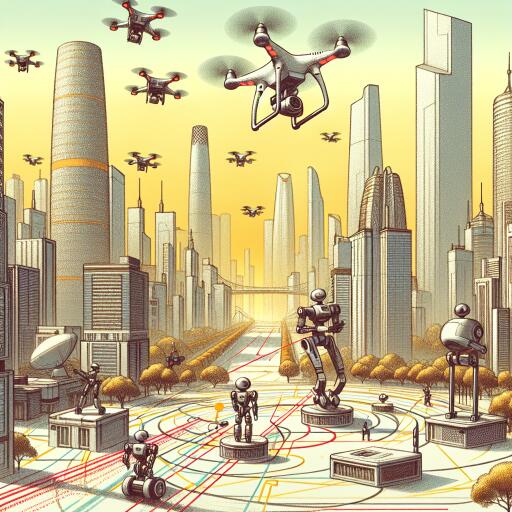Drones and Robots Join Forces as China’s Guangzhou Launches Global AI Competition
International attendees gathered at the launch of the 4th Pazhou Algorithm Competition, a groundbreaking event that witnessed the collaboration of drones and robots in addressing a real-world Artificial Intelligence (AI) challenge. Held on April 28 at the picturesque Haizhu National Wetland Park in Guangzhou, the capital of South China’s Guangdong Province, this competition marked the official commencement of the 4th edition of the Pazhou Algorithm Competition.
The event kicked off with the “Air-Ground” Integrated Collaboration AI Competition, an innovative challenge that transformed 16,000 square meters of natural wetland into a dynamic testbed. The task for participating teams was to design cutting-edge algorithms that enable seamless coordination between drones and ground robots to track and approach a moving target measuring 30 centimeters, all within a precision margin of no more than five centimeters.
The competition placed a spotlight on evaluating real-time sensing, path planning, and effective collaboration among machines outfitted with advanced visual perception systems and millimeter-wave radar. Demonstrating remarkable prowess, teams from Nanjing University of Aeronautics and Astronautics and China’s telecom giant, China Telecom’s Guangzhou branch, emerged victorious, clinching the first and second positions respectively.
Pazhou is quickly becoming synonymous with technological innovation as it hosts the Pazhou Algorithm Competition in its core area, which serves as Guangzhou’s pilot zone for artificial intelligence and the burgeoning digital economy. Since its inception in 2022, the competition has skyrocketed in prominence, with industry observers likening it to the “Canton Fair of artificial intelligence,” thanks to its extensive participation, technological depth, and its strong emphasis on real-world applications.
This year’s competition is segmented into five main tracks: the “Air-Ground” Integrated Collaboration AI Competition, the Large Model Algorithm Optimization Competition, the AI Innovation Application Competition, the “AI for All” Competition, and an International AI Competition. These tracks encompass a wide range of pivotal areas including large-model algorithms, the consumer internet, smart transportation, network and data security, intelligent manufacturing, and other emerging industries.
Organizers have extended invitations to local teams to compete on an international level while simultaneously attracting global participants to China. This initiative not only aims to elevate local talent but also to position Guangzhou as a global hub for AI excellence.
The stakes are high for participating teams, as winners are not only rewarded with fabulous prizes but are also bestowed with a comprehensive support package. This includes million-yuan worth in computing and data vouchers, incubation services, project showcasing platforms, financial consulting, and assistance in securing public funding and startup loans. Such incentives are designed to propel innovative ideas from concept to commercial success.
As the global demand for AI innovation climbs, Guangzhou is strategically positioning itself as a pivotal node within the international AI ecosystem. With Pazhou at the center, the city aims to connect groundbreaking technological advancements with promising opportunities for cross-border collaboration, setting a robust foundation for a technologically enriched future.
The 4th Pazhou Algorithm Competition is more than just a test of technical skill; it is a celebration of innovation, collaboration, and the transformative power of AI, making Guangzhou a key player on the global stage of artificial intelligence innovation.










